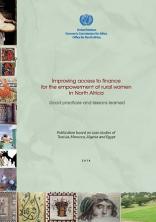Improving Access to Finance for the Empowerment of Rural Women in North Africa: Good Practices and Lessons Learned

According to FAO, reducing gender inequalities regarding access to resources, services and employment could develop the agricultural production of these countries by 2.5 to 4 per cent, and globally help to reduce the number of people suffering from hunger by 100 to 150 million. But the reality on the ground is quite different. Women living in rural areas face many obstacles, mainly in their access to education and schooling, employment opportunities, land ownership and access to other productive resources such as all forms of financing. In view of these unequal opportunities, rural women are limited to modest and lower yielding activities, and work mainly in the informal economy.
This paper aims to identify difficulties and discriminations hindering women’s access to and control over funding resources, highlight best practice and analyze prospects for a better adjustment of strategies to enhance rural women’s access to finance, to promote their rights and role as development players.
This study also raises the issue of how to develop rural areas through integrated development programs, in order to help stabilize women - but also educated rural girls - in their home environment, to root them deeply in that environment particularly by improving its economic attractiveness. Access to finance and qualitative support, along with the creation of alternatives and opportunities in new sectors such as information technologies, activities related to ecotourism and green economy, are a few of the courses of action this study recommends for consideration.